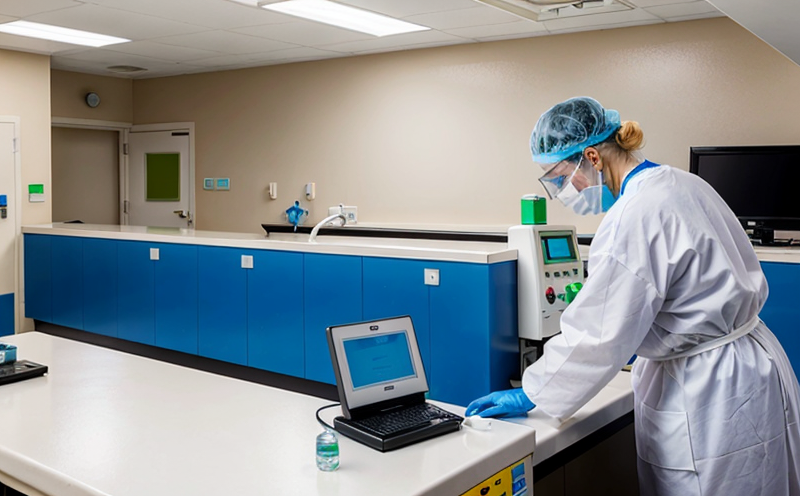HEPA Filter Efficiency Testing in Hospital Ventilation Systems
In hospital environments, ventilation systems play a critical role in maintaining air quality and ensuring patient safety. HEPA (High Efficiency Particulate Air) filters are essential components of these systems as they trap particles as small as 0.3 microns with an efficiency exceeding 99.97%. This service focuses on the rigorous testing of HEPA filter efficiency within hospital ventilation systems to ensure compliance with international standards and best practices.
HEPA filters are crucial in preventing the spread of airborne pathogens, allergens, and other contaminants that can exacerbate respiratory conditions and pose health risks to patients. Hospitals must adhere to stringent hygiene protocols to minimize the risk of infections and cross-contamination. The testing of HEPA filter efficiency is therefore a vital step in maintaining these standards.
The testing process involves subjecting the filters to specific particle challenges, typically using standardized test aerosols that simulate real-world conditions. The performance metrics are then compared against internationally recognized guidelines such as ISO 14683:2019 and EN 1822-1:2015. These standards provide clear acceptance criteria for filter efficiency, ensuring consistency across different testing environments.
Our laboratory employs state-of-the-art equipment to conduct these tests, including particle counters and aerosol generators capable of producing the required particle sizes. The testing procedure is meticulously documented, and results are reported in a comprehensive manner that includes detailed pass/fail criteria aligned with international standards.
The importance of this service cannot be overstated. Hospitals that fail to maintain HEPA filter efficiency may risk compromising patient health and safety. Regular testing ensures continuous compliance and helps identify any potential issues early on, allowing for timely maintenance or replacement of filters. This proactive approach not only enhances hygiene but also contributes to the overall operational efficiency of hospital ventilation systems.
Moreover, the data generated from these tests can be used in research and development efforts aimed at improving filtration technology. By understanding the performance characteristics under various conditions, healthcare providers can make informed decisions about filter design and implementation strategies.
In summary, HEPA Filter Efficiency Testing in Hospital Ventilation Systems is a critical component of maintaining hospital hygiene standards. It ensures that filters are performing optimally to protect patients from airborne contaminants, thereby contributing to safer and healthier environments within hospitals.
Scope and Methodology
| Test Parameter | Description | Acceptance Criteria |
|---|---|---|
| Aerosol Challenge | The filter is exposed to a standardized aerosol containing particles of 0.3 microns. | Efficiency should be ≥99.97% as per ISO 14683:2019. |
| Test Duration | Testing is conducted over a period of 3 hours to ensure thorough performance evaluation. | No significant drop in efficiency during the test period. |
| Temperature and Humidity Conditions | The filter is tested under controlled environmental conditions mimicking typical hospital settings. | Temperature: 21°C ± 3°C, Humidity: 45% RH ± 5% RH. |
| Data Collection | All test parameters are continuously monitored and recorded using automated systems. | Average efficiency should be calculated over the entire test period. |
Why Choose This Test
Ensures compliance with international standards such as ISO 14683:2019 and EN 1822-1:2015.
Provides reliable data for ongoing maintenance and replacement of filters.
Helps identify potential issues early, minimizing the risk of airborne contamination.
Sustains a safer environment by preventing the spread of pathogens.
Supports research and development in filtration technology.
Achieves regulatory compliance for healthcare facilities.
Enhances operational efficiency through continuous monitoring and optimization.
Maintains patient safety by ensuring optimal filter performance.
International Acceptance and Recognition
The testing of HEPA filters in hospital ventilation systems is widely recognized across the globe. The standards set forth by organizations like ISO (International Organization for Standardization) and EN (European Norms) are followed by healthcare facilities worldwide to ensure consistency and reliability.
ISO 14683:2019 provides a framework for testing and classifying air filters, while EN 1822-1:2015 specifies the performance requirements for HVAC systems. These standards are crucial in validating the efficiency of HEPA filters and ensuring that they meet the stringent hygiene demands of hospital environments.
By adhering to these international guidelines, hospitals can demonstrate their commitment to maintaining high levels of air quality and patient safety. This not only enhances public trust but also ensures regulatory compliance, which is essential for ongoing operations in healthcare settings.





